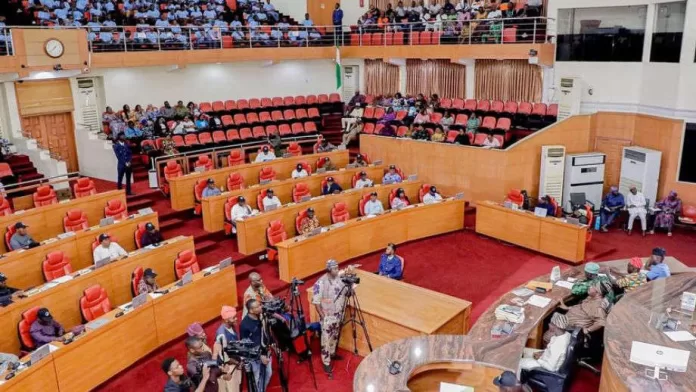Operatives of the Department of State Security (DSS) and Nigeria Police, in the early hours on Monday, gained entrance into the Lagos State House of Assembly.
It was gathered that about 10 a.m., security personnel had taken control of the assembly premises at Alausa, Ikeja, frisking passersby and restricting movement.
However, despite the security clampdown, Speaker Meranda arrived at the complex with her convoy at about 11:15 a.m.
After her arrival, the lawmakers expressed confidence in her leadership as the House settles to plenary.
The development follows a deepening leadership crisis within the assembly, sparked by the removal of former Speaker Mudashiru Obasa.
READ ALSO: US Shuts Abuja Embassy, Consulate General In Lagos On Monday For Presidents’ Day
Obasa, who was ousted in absentia on January 13, 2025, by 32 out of 40 lawmakers while on a trip to the United States, has described his removal as a “coup”.
In response, Obasa has filed a lawsuit at the Ikeja Division of the Lagos State High Court, challenging the legality of his removal. His legal team, led by Senior Advocate of Nigeria (SAN) Chief Afolabi Fashanu, is seeking an accelerated hearing of the case.
The motion, filed on Wednesday, February 12, 2025, names the Lagos State House of Assembly and the new Speaker, Mojisola Meranda, as defendants.
Among other reliefs, Obasa is requesting the court to fast-track proceedings and shorten the timeframe for the defendants to respond.
The leadership dispute has divided key figures within the Lagos All Progressives Congress (APC), including members of the influential Governance Advisory Council (GAC). While some back Obasa’s return, others support his ouster.
Obasa’s application is based on nine key points, including the interpretation of various sections of the Nigerian Constitution (1999, as amended) and the Rules and Standing Order of the Lagos State House of Assembly.
In his suit, he argues that the case revolves around interpreting Sections 36, 90, 92(2)(c), 101, and 311 of the Constitution, along with specific provisions of the House’s Standing Order, which carry constitutional authority.
Obasa is challenging the legality of the Lagos State House of Assembly’s session on January 13, 2025, during which he was allegedly impeached as Speaker.
Obasa contends that the House convened during recess without his approval or delegation of authority, which he believes is unconstitutional.
He is seeking an urgent hearing, arguing that the case should be resolved quickly to prevent disruptions in the state’s legislative activities.
He also questions the legitimacy of the House’s continued proceedings under its new leadership, claiming they violate constitutional provisions and House rules.
Obasa has requested the court to fast-track the case by shortening the timeframe for responses from both sides.
He insists that an expedited hearing is necessary due to the exceptional nature of the case and that granting his request would not cause unfairness or harm to any party involved.


